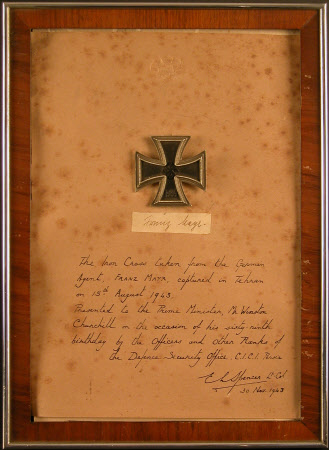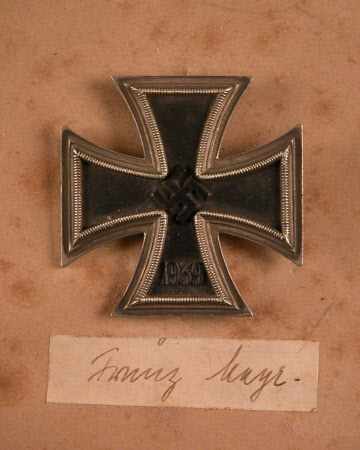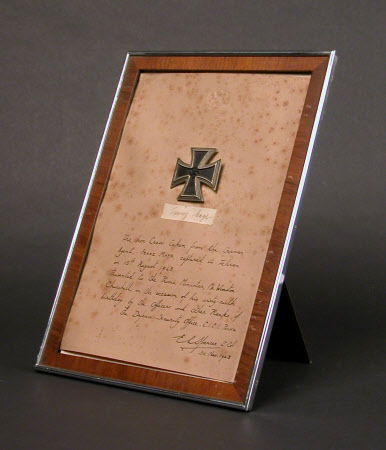Iron Cross
Category
Coins and medals
Date
1939
Materials
Chromium, Iron, Wood
Measurements
279 x 203 x 15 mm
Order this imageCollection
Chartwell, Kent
NT 1101253
Summary
An Iron Cross, dated 1939 taken from the German agent Franz Mayr who was captured in Teheran 15 August 1943, presented by the Officers and other ranks of the Defence Security Force C.I.C.I.Persia 30th November 1943 mounted in a wood and chromium frame. Formerly part of the Heirloom Collection.
Full description
Franz Mayr was a highly trained professional agent from Himmler’s S.D. organisation. Mayr was head of the German spy network in Iran and had extensive contacts with most sections of Iranian society including senior figures within the Iranian Army. Mayr went into hiding after the allied invasion and was captured on August 15th 1943 in Tehran. The Iron Cross was presented to WSC on his 69th birthday during the Tehran conference. After receiving a tip, the British intelligence officers were led to the hiding place of Franz Mayer in Isfahan. Documents, notes, and letters were seized that revealed methods used by the German Fifth Column in Iran. Mayer was the head of the German spy network in Iran. Other important German spies were named as Schultzer, Kummel, and Weissrock. The documents also showed that Habibollah Nouri, a member of the Iranian parliament had regular correspondence with Mayer and his top aid Hossein Vaziri. A top military officer, General Zahedi was accused of hiding Mayer in Isfahan. Zahedi's arrest coincided with the riots on Dec, 8 and 9 due to bread scarcity and did not get enough public attention. The Iranian foreign minister protested the arrest and asked for his interrogation and trial by Iranian authorities. In August, 1943 several others were arrested and interrogated by the British at Soltanabad. One year later, on Aug, 30, 1943 a joint list by the occupation forces was presented to the Iranian prime minister that included 162 Iranians whose names were found in documents in Mayer's house in Isfahan. On Sep, 29th, the attache of the USSR embassy asked the ministry of the foreign affairs to deliver some of detainees in Arak to Rasht in order to be interrogated by the Soviets. Although they received a negative response from the Iranian authorities, occupation forces actually did whatever they wanted including torture, and other atrocities, most of which was not revealed due to censorship and the atmosphere of war. (Updated: Nov, 3, 2008)


